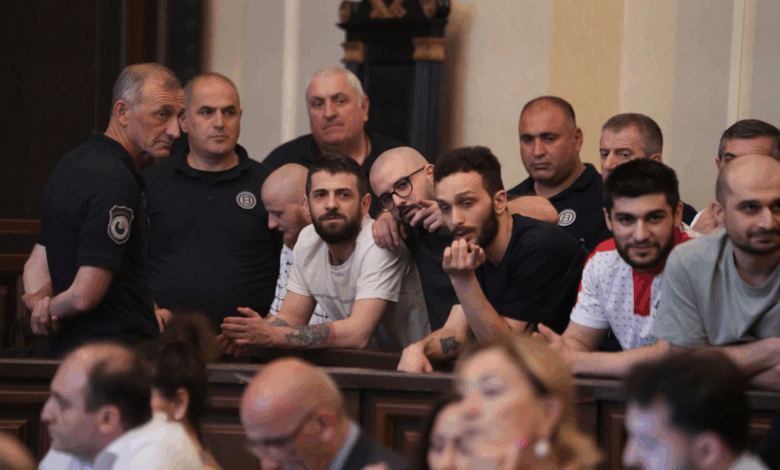
Detained Protesters Say They Are Promised Pardon If They Apologize
Protesters detained during pro-EU demonstrations in Georgia reported receiving promises of pardon in exchange for apologies, as the Georgian Dream government continues to face local and international pressure over the release of dozens whose cases are widely believed to be politically motivated.
The reports come as the announcements of at least two verdicts in other protest-related cases have been delayed, with judges asking for more time to consider the circumstances. Several protesters have been sentenced to months and years in jail, and dozens more await verdicts as polls suggest overwhelming popular support for their release.
“As time goes by, more and more often there comes information, and a desire, that if I apologize, they will release me,” Andro Chichinadze, a prominent actor and one of the detainees in a case of eleven protesters arrested on group violence charges in connection with pro-EU protests, told the court on July 29, according to the Netgazeti live blog from the hearing. “They should offer this pardon to those police officers who were running around on Rustaveli [Avenue]. I don’t need a pardon. The charges are trumped up.”
Chichinadze did not specify who made the offer, but said the same goes for other detained protesters who also wanted to speak up. Other protesters charged in the same case and present in the courtroom – including Onise Tskhadadze, Jano Archaia, Giorgi Terishvili, Irakli Kerashvili, and Luka Jabua – then echoed the actor’s determination not to seek a pardon, presumably to be granted by Georgian Dream-elected president Mikheil Kavelashvili.
Earlier, Kavelashvili openly offered to pardon opposition leaders, currently in jail over boycotting the Tsulukiani Commission, a controversial investigative body in the Georgian Dream’s one-party parliament, given that politicians would pledge to take part in local elections slated for October 4.
Eight persons, including six opposition party leaders – Nika Gvaramia, Nika Melia, Giorgi Vashadze, Mamuka Khazaradze, Badri Japaradze, and Zurab Japaridze – remain behind bars as the opposition is split over the participation in the municipal vote, with some vowing to boycott while others – including Lelo/Strong Georgia, led by Mamuka Khazaradze and Badri Japaridze- are determined to run. None of the detained leaders accepted Kavelashvili’s offer, however.
The offers come as the issue of jailed protesters and political leaders, as well as journalist Mzia Amaghlobeli, continues to draw pressure and discontent towards the ruling Georgian Dream party. European officials and diplomats have repeatedly expressed concerns about what they view as arbitrary arrests, and Brussels has warned of consequences, including suspension of visa-free travel with the EU, if Georgia’s democratic backsliding isn’t reversed.
The results of a poll by the Institute of Social Studies and Analysis (ISSA), released early in July, suggested 73% of surveyed Georgians, and even 40% of Georgian Dream supporters were in favor of releasing detained protesters.
“The Georgian people do not believe in the young people detained during the protests or Mzia Amaghlobeli being criminals, something that propaganda so eagerly claims,” Iago Kachkachishvili, a sociologist and ISSA Board Chairman, said when commenting on the survey results.
The reports about possible pardon deals also come amid delays in verdict announcements in two protest-related cases: that of Giorgi Akhobadze, a prominent doctor and activist arrested during protests on serious drug charges, and Anatoli Gigauri, a protester and war veteran charged with assaulting a police officer. Both have pleaded not guilty. Akhobadze has argued that his case involves politically motivated drug planting and a lack of impartial evidence, while Gigauri’s defense points to video footage showing the police officer striking him first.
The verdicts in both cases were initially scheduled for July 28 but were postponed, with new dates yet to be announced. While the precise reason for the delay in Akhobadze’s case remains unclear, in Gigauri’s case, the judge cited the need for further assessment of the circumstances, including whether the defendant’s actions constituted self-defense.
Earlier, in a surprise move, prosecutors in the case of Saba Skhvitaridze, also initially charged with assaulting a police officer during the protests, decided to reduce the charges to “intentional minor bodily harm.” The decision followed the defense’s argument that Skhvitaridze could not have known the man in question was a police officer. Skhvitaridze has also pleaded not guilty, claiming he acted in self-defense after the man first slapped a woman who was accompanying him.
Confusion is mounting as courts operate at full speed throughout the summer, holding frequent hearings in group violence cases, often several times a week. Lawyers suspect the rush reflects a determination to issue verdicts before the nine-month limit on pre-trial detention expires. Several guilty verdicts have already been handed down, mostly sentencing protesters to years in prison for allegedly assaulting police officers. Yet recent delays and procedural shifts have fueled cautious optimism within the opposition, suggesting that cracks may be forming in the otherwise GD-loyal judiciary.
“The judges started to protest political orders en masse,” Nika Gvaramia, jailed leader of the opposition Ahali party, said in a post published on his Facebook account on July 29, arguing that judges are facing mounting social pressure over their role. The judges “are very troubled by social isolation and fair resentment from the citizens,” Gvaramia noted.
Also Read:
- 18/07/2025 – Protester Anri Kvaratskhelia Sentenced to 4.5 Years in Jail Over Molotov Cocktail Allegations
- 10/07/2025 – 19-Year-Old Protester Saba Jikia Sentenced to 4.5 Years in Jail Over ‘Assaulting’ Police
- 03/07/2025 – Protester Giorgi Mindadze Sentenced to Five Years in Jail over ‘Assaulting’ Police
- 12/06/2025 – Mate Devidze Sentenced to 4.5 Years in Jail
This post is also available in: ქართული